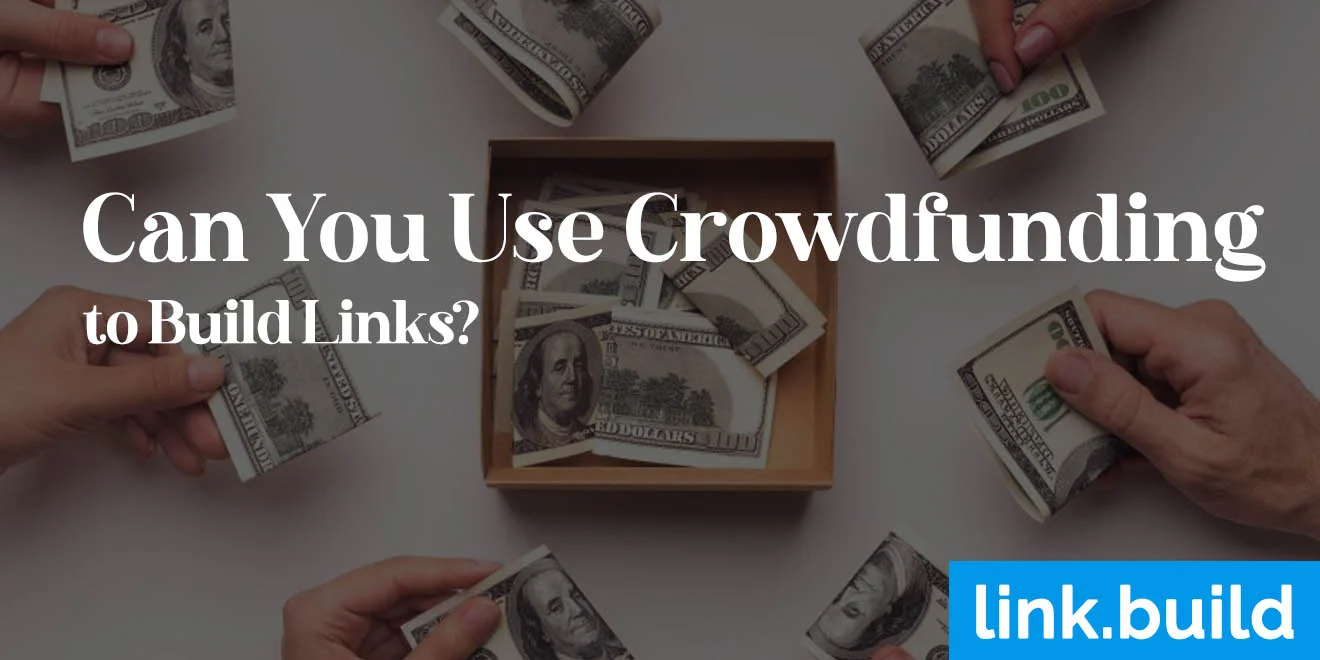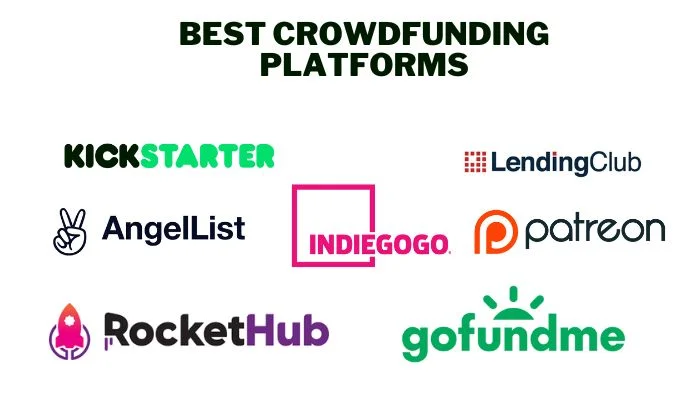Can You Use Crowdfunding to Build Links?

It may seem strange to mention crowdfunding and link building in the same sentence.
Yet here we are.
Honestly, we were a bit skeptical of this tactic when we first heard about it too.
But that might be because we misinterpreted it.
Link building through crowdfunding isn't the process raise funds from contributors to fuel your link building. Rather, it's a way of using crowdfunding mechanisms to build links in support of your SEO strategy.
Interesting, right?
But how exactly does this novel strategy work?
And why should you even consider it?
The Basics of Crowdfunding-Based Link Building
Let's start with the basics.
You probably already know what crowdfunding is, but we'll give you a brief definition just in case you don't. Crowdfunding is the process of collecting money, or similarly valuable contributions, from a wide range of people and for a specific purpose. For example, if you have a prototype of a novel consumer product and you need $50,000 for the first run, you can ask 1,000 people for $50 each to fund the project – and reward each of them with a finished product once the run is complete.
It's a great way for entrepreneurs, innovators, creators, and other geniuses to raise money they need to start or create something new. It's also a great way for individual consumers and investors to get access to new products and new creative projects early – and get more involved in the creative process.
So how do we leverage this for link building?
Essentially, your brand is going to make contributions to various crowdfunding campaigns.
In many cases, project leads are willing to offer a link to your website in exchange for a certain donation. This link will typically be featured on a “backer’s list” page or on a “thank you” page, or something similar.
Either way, you'll benefit from new authority passed to your website – as well as brand visibility.
That's on top of whatever benefits you get from contributing to the campaign generally.
There are several advantages to this approach:
- Alignment with Google guidelines. Hopefully, we don't need to tell you that Google frowns upon active link buying. In fact, Google frowns upon anything related to direct ranking manipulation. But because you're not actually paying for a link in this framework (i.e., you're simply donating money and getting a voluntary thank-you), link building via crowdfunding is actually perfectly aligned with Google guidelines. You'll never have to worry about penalties by pursuing this approach, as long as you do it above board.
- Limited competition. As we'll see, there are some downsides and weaknesses associated with using crowdfunding link building strategy. On top of that, this is a relatively unknown, unnoticed technique among SEO experts. Accordingly, there's very limited competition. This might be a great way to get an edge over your rivals or practice a method of link building that doesn't require much spending or aggression.
- High-quality links. Realistically, this is a way to get some very valuable links. Earning links from top crowdfunding platforms themselves should earn you significant domain authority. But of course, the quality of the link you earn from your contribution is going to depend on the authority of the project owner. Even so, contributing to crowdfunding campaigns can be a way to get exposure on some very high-profile websites.
- Reliable and consistent output. There are new crowdfunding projects posted all the time, and the crowdfunding game isn't going away anytime soon. If you can create a consistent, repeatable process for finding good crowdfunding projects, this method can give you reliable and consistent link building output.
Now before you get too excited about the possibilities here, we need to acknowledge that there are some weaknesses and limitations associated with this strategy.
Put simply, this is a bit hard to pull off.
It takes time to find good projects. Not all projects offer links as part of their rewards. Certain donations can cost a lot of money. And on top of that, replicating your results can be tricky.
Still, for many brands, this is an awesome link building strategy to add to your repertoire.
How to Choose the Best Funding Opportunities for Link Building
Much of your success will be contingent upon your ability to find the best crowdfunding opportunities for your link building strategy.
Obviously, not every crowdfunding project is going to be a good fit.
And some crowdfunding projects are going to be much better fits than others.
If you can narrow the scope of your search sufficiently, you can prioritize only the best crowdfunding campaigns and earn only the best links for your SEO strategy.
The best crowdfunding opportunities offer:
- Relevance. If you want the link to be a good fit, you should prioritize projects that are at least somewhat relevant to your brand. Ideally, you'll be funding projects that are either related to your business or related to the industry in which you work. But at the very least, you should choose projects that make some intuitive sense for your brand.
- High authority. As with other link building strategies, the higher the authority of the referring page, the better. There are literally millions of crowdfunding projects out there, but many of them are associated with websites with low authority – and sometimes, individuals with no websites at all. If you want to maximize your results, you need to prioritize pages with higher authority to send your way.
- Association with a credible entity. Remember, link building isn't just about building domain authority or earning traffic. It's also about establishing your reputation and credibility. Accordingly, you need to exercise caution to avoid funding projects from dubious or untrustworthy creators. Always make sure that you're funding projects associated with some kind of credible entity, such as a well-known business, a creator with a good track record, or a public figure with adequate credentials.
As with most things in life, the easiest approach to find projects that fit these criteria is to use a search engine.
Obviously, you can spend lots of time browsing crowdfunding websites to find good projects as well. But you're going to be much more successful and you'll find projects faster if you use search operators to refine your search engines like Google.
Try these search operator templates to find good opportunities for building links through crowdfunding.
site: [crowdfunding website’s url] inurl:projects + “link to your website”
site: [crowdfunding website’s url] inurl:projects + “donor page”
All you'll need to do is replace “crowdfunding website’s url” with the URL of your chosen crowdfunding website. (We'll talk about those more in a moment).
Additionally, you can tack on some keywords at the end of this string to make sure only relevant projects appear in your search results.
And if you plan on doing this regularly, you can use Google Alerts to automate the entire process.
Link Building: Donating and Following Up
So what do you do once you’ve found a reasonable project to fund?
- Verify the offer. First, take a moment to verify the offer. Read the descriptions of each offer carefully so you know what you're getting. Verify that in exchange for your contribution, a link to your website will be posted, and verify where that link will be posted. Don't settle for simple shout outs or mentions on social media; these may help support your brand visibility slightly, but links are far more valuable.
- Examine existing links. Take a moment to look at other links that have already been posted to the target page. This will help you verify that the offers are being successfully fulfilled. It's also a great opportunity to check whether these links are dofollow links or nofollow links. Nofollow links aren't worthless, but dofollow links are much better for your SEO campaign. Prioritize funding projects with dofollow links only.
- Choose your contribution level. Next, you'll need to choose your contribution level. You may only earn a link if you contribute above a certain threshold. Keep in mind that you can choose to donate more if there are other rewards that entice you or if you simply want to support the project for personal reasons.
- Enter the requisite details. After selecting the contribution level, you may need to provide some additional details, including your name, payment information, and more. You'll also need to provide a URL for your website. Most crowdfunding sites are designed to make this quick and easy.
- Confirm. Verify everything one last time and confirm your payment.
In most cases, creators are very reliable and grateful for contributions, so they work quickly to establish your link on their website. However, if you notice that your link hasn't been posted in a reasonable amount of time, feel free to reach out to the project owners as a follow-up.
The Best Crowdfunding Platforms for Link Building

These are some of the best crowdfunding platforms to use for link building, due to their popularity, prominence, and diversity of projects:
- Kickstarter. Kickstarter was one of the first crowdfunding platforms to gain popularity, and it’s especially noteworthy for its support for products in tech and design.
- GoFundMe. GoFundMe is currently the most popular crowdfunding platform around, in part because it allows almost any type of project. Personal and charitable causes are especially popular here.
- Indiegogo. Indiegogo started out exclusively serving indie films, but now serves a variety of creative interests – and it offers both fixed and flexible funding options.
- RocketHub. RocketHub is a crowdfunding platform that has eventually expanded to offer educational resources for entrepreneurs.
- AngelList. AngelList launched as a platform to help tech startups find seed funding, but now provides many forms of support to startups and small businesses.
- Lending Club. Lending Club started as one of the first peer lending websites in the U.S., and it now offers a wide range of lending and borrowing options for its network members.
- Patreon. Patreon functions a little differently than most crowdfunding platforms, sustaining content creators with consistent income and encouraging regular donations from contributors.
Starting Your Own Crowdfunding Campaign
Note that it's also possible to build links by starting your own crowdfunding campaign.
If you have a crowdfunding project on one or more of these platforms, those platforms will almost necessarily link to your website. Popular crowdfunding platforms, especially at the upper echelons, have high authority, which can easily be passed to your website. You can also customize your crowdfunding page to include target keywords that support your broader SEO efforts.
Crowdfunding campaigns are also a good way to generate good PR and engage with your audience, especially if you plan on launching a new product with the funds you raise.
However, there are some important caveats here.
First, you'll actually need a meaningful project. Most crowdfunding websites won't allow you to create a project unless you have something tangible and meaningful to offer.
Second, you'll need to put some thought and effort into your crowdfunding page if you want people to contribute to it. Without solid descriptions, a good pitch, and good rewards, you probably won't generate much momentum.
Third, if you fail to deliver on any of your promises, it could lead to reputational backlash.
And fourth, there's a chance that any links you build via crowdfunding page will eventually be removed if your page expires.
Is Link Building Via Crowdfunding Worth It?
So is it worth it to try and build links via crowdfunding?
That depends on your business, your goals, and the rest of your SEO strategy.
This approach to link building is accessible, reliable, safe, and relatively free from competition. But it's also very expensive and time consuming – and not all projects will be a good fit for your brand. This dynamic means that most (though not all) companies can benefit from using crowdfunding as a link building strategy.
And as with most link building strategies, it shouldn't exist in isolation. The best link building approaches combined many different techniques and angles, diversifying your SEO portfolio and minimizing risk in the process.
If you need help getting started with your crowdfunding link building campaign, or if you need further support with any SEO services, contact us for a free consultation today!


.svg)

.jpg)
.jpg)
.jpg)